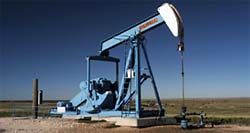Submitted by Diane Farsetta on
 As gas and food prices rise, so does scrutiny of industry profits. But "food and energy companies have learned a lot since the 1970s about how to deal with public indignation," writes George Anders. In 1980, "Congress hit the energy industry with a windfall profits tax" that lasted until 1988. While Congress is holding hearings now, oil executives "are better at deflecting attention from their own companies, arguing that state-owned, foreign oil companies control most of the world's reserves, and that financial speculators" drive price fluctuations. As they prepare to announce their first-quarter 2008 earnings, Exxon Mobil executives are "hammering out possible responses to questions ... about the sheer size of the company's profit." The largest U.S. ethanol producer, Archer Daniels Midland, is holding conference calls decrying the "misguided attacks on biofuels," to "avoid being portrayed as the villain in rising farm-product prices." Oil companies "have hired plenty of lobbyists and supported trade groups, such as the American Petroleum Institute. ... Food companies may soon find themselves redoubling similar efforts of their own."
As gas and food prices rise, so does scrutiny of industry profits. But "food and energy companies have learned a lot since the 1970s about how to deal with public indignation," writes George Anders. In 1980, "Congress hit the energy industry with a windfall profits tax" that lasted until 1988. While Congress is holding hearings now, oil executives "are better at deflecting attention from their own companies, arguing that state-owned, foreign oil companies control most of the world's reserves, and that financial speculators" drive price fluctuations. As they prepare to announce their first-quarter 2008 earnings, Exxon Mobil executives are "hammering out possible responses to questions ... about the sheer size of the company's profit." The largest U.S. ethanol producer, Archer Daniels Midland, is holding conference calls decrying the "misguided attacks on biofuels," to "avoid being portrayed as the villain in rising farm-product prices." Oil companies "have hired plenty of lobbyists and supported trade groups, such as the American Petroleum Institute. ... Food companies may soon find themselves redoubling similar efforts of their own."

Comments
Diane Farsetta replied on Permalink
More examples of oil industry PR...
From the [http://www.desmoinesregister.com/apps/pbcs.dll/article?AID=/20080430/BUSINESS/80430004/-1/NEWS04 Des Moines Register]:
And two West Virginia papers covered an American Petroleum Institute staffer's talk to the Wheeling Rotary Club. It's at least her second talk to Rotarians in West Virginia this year, oddly enough: